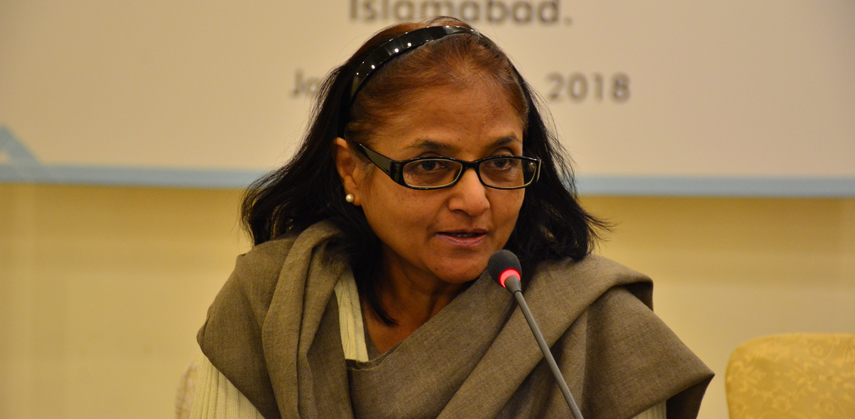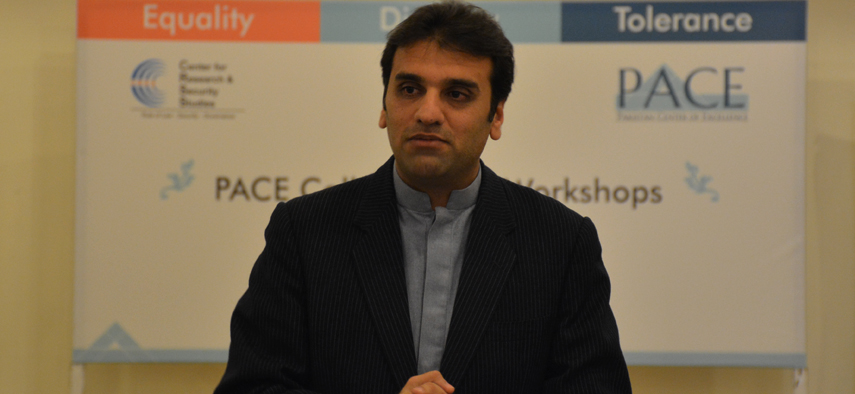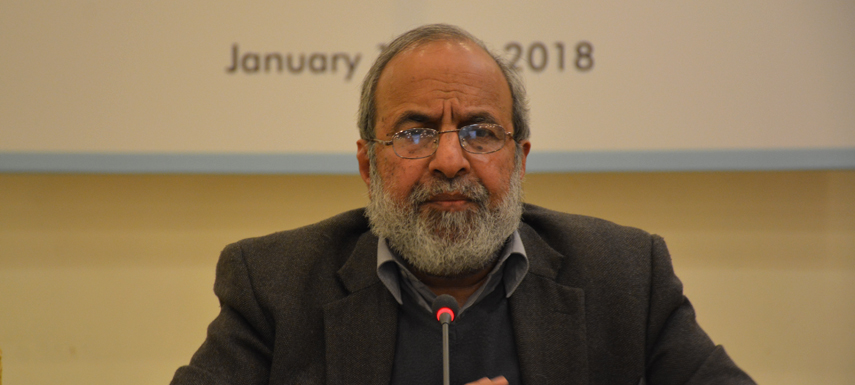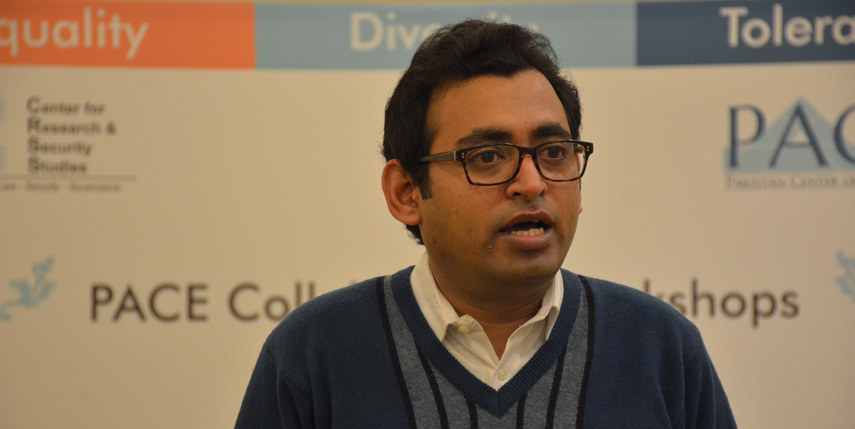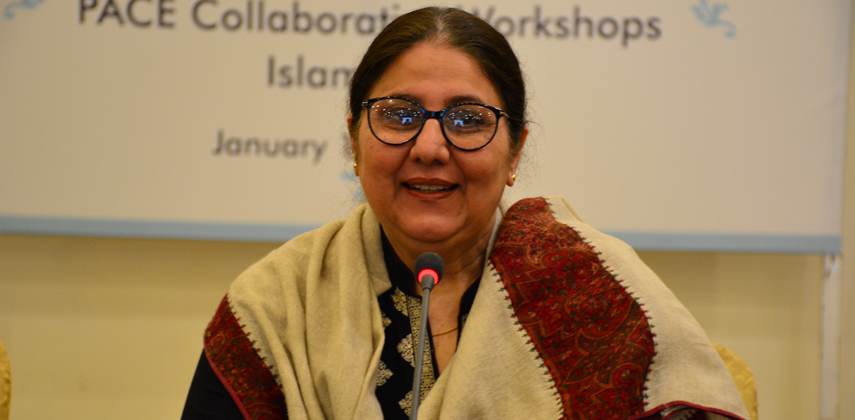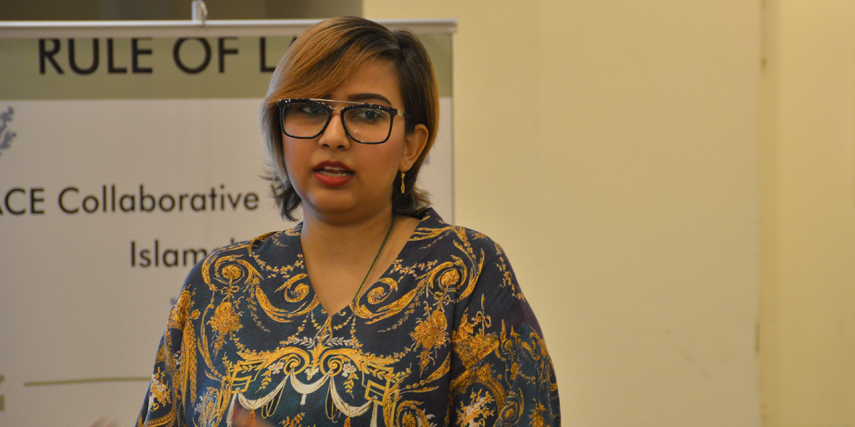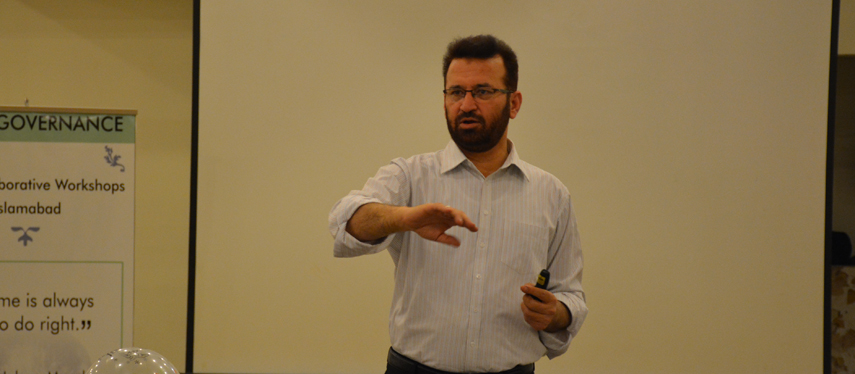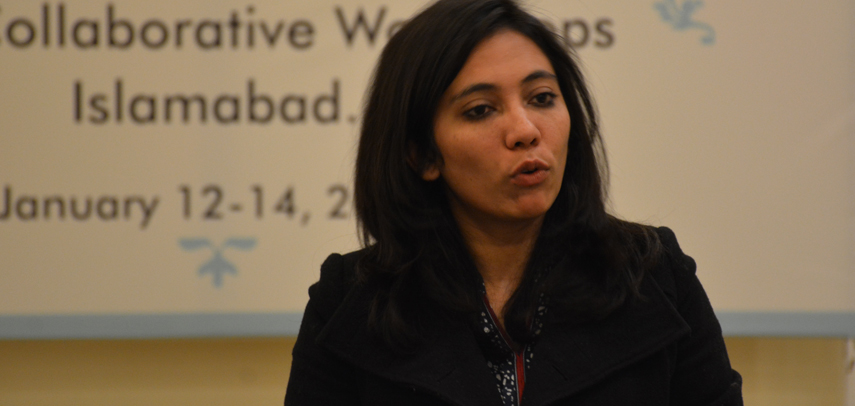The Center for Research and Security Studies (CRSS) conducted the 25th three-day PACE Collaborative workshop for young university lecturers and professors from January 12-14, 2018, at Hill View Hotel, Islamabad. The workshop was conducted under the umbrella of the Pakistan Center of Excellence (PACE), a counter-radicalization, pluralistic values focused project, in collaboration with the Dutch Government. Participants included young university lecturers and professors from all across Pakistan including Sindh, Balochistan, Punjab, KP, AJK, FATA and GB.
OPENING
Chief Guest: Ms. Jennifer Katherine
Ms. Jennifer Kathernie Jag Jivan kicked off her session saying, “The topic of respect for diversity is a vast topic and we will try to broadly talk about certain aspects. The term respect for diversity is not an airy fairy thing, it not something conception; it arises out of experience. It goes into our subconscious, our behavioral pattern and translates into our attitudes. It always has a context and a context will always be associated with a culture. The values we derive from a common way of living and because they are diverse in the world so they will be multiple meanings. When we are talking in terms of diversity we have to be aware of the multi facets that it has such as linguistics, political, economics, religious and social. With it, it is associated that how a society in a given context and culture operates.”
She continued, “Diversity has life; it is something living because we experience it. It breathes within us. If you will think of diversity as something from outside, you will never be able to capture the entirety of the subject. If we are for diversity, we will start thinking of pluralistic and multicultural society. It leads us to inclusivity towards life and political system. Individuals can be different according to their cultural, religious, class, gender, regional and racial patterns. If we look at it from an exclusive approach; it tends to limit and confine oneself. In the context of Pakistan, we see sectarian violence going on. There is religious anarchy and gender discrimination.”
“Islamic concept of “Huqooq ul Ebad”, beautifully depicts the rights of citizens over each other. Christianity also believes in universal love without any discrimination. Similarly, all the religions are based on love for all. By discriminating, we are hurting ourselves and our own people. We as equal human being come out of the discriminatory and biased attitudes and respect each other,” she concluded.
Ammad Khaliq: Media and Ethics
Mr. Ammad Khalique kicked off his session on “Media & Ethics”. He started with the definition of “Media” and “Ethics”, media is the collective communication outlet or tool that is used to store and deliver information or data. Specialized mass media channels include print media, social/digital media, photography, advertising, cinema, and broadcasting (Radio, TV). Speaking on the freedom of expression, he referred to Article 19 of the UN Charter, “Everyone has the right to freedom of opinion and expression; this right includes freedom to hold opinions without interference and to seek, receive and impart information and ideas through any media and regardless of frontiers.”
He defined ethics as the way people behave based on their beliefs about what is right and wrong and how it influences their behaviors and values. He shared his views on ethics in journalism with following points:
- Seek truth and report it
- Minimize harm
- Act independently
- Maintain standards of decency
- Be accountable
He also said that being neutral and presenting authentic news is one of the values that should be kept in mind while reporting certain issues. Media is bound in some cases and cannot be open and expose the facts. He said that words are sometimes misinterpreted and other times twisted when reporting sensitive issues; therefore, extreme care should be taken while debating on such issues. He stressed that the reporters while broadcasting should use decent language.He shared few laws and ethics that are binding upon media:
- Cyber Stalking
- Cyber Bullying
- Cyber Masking
- Cyber Frauds
- Hate Speech
- Defamation
- Intrusion to Privacy
- Harassment
- Cyber Crime Bill 2016
- Cyber Wing (FIA)
Dr. Khalid Zaheer: Religious Intolerance
Dr. Khalid Zaheer kicked off the second session of the day and spoke on the topic of religious intolerance. “Religious tolerance is the right one should give to others to believe in and practice faith of their choice. We can’t impose our views on others and we can’t blame others for their beliefs and ideas. You can’t respect a view despite of strongly disagreeing with it but you can show tolerance towards it. When we say, we allow others to have religious freedom and we can’t impose our point on other genuinely, that is called religious tolerance. We have no right to impose our beliefs on others. Our attitude toward other’s beliefs should be genuine and positive. People usually believe in and practice ideas and beliefs what they have learnt from their elders or what they have been convinced by. Islam teaches us not to use abusive language for other religions or faiths and respect them. If Islam says so; then why some Muslims are intolerant? There are a few arguments in front of them that are making them violent and intolerant. There is also a restrained religious setting who cut people off the society and there is always confinement in communication. Questioning is not allowed in such environments and they make you blindly follow the ones who lead such groups. We need to get rid of such environments, groups and thinking that are leading us to extremism and religiously intolerant society. We should not be violent towards the people who are not of the same belief as us. Everyone has right to do whatever they want and believe. Being humans, we expect others to tolerate us; same is what they expect from us.”
Mr. Abdullah Dayo: The Role of Youth in Countering Violent Extremism
Mr. Abdullah Dayo started the discussion on the topic by defining the terms of “extremist” and “terrorist”. “Extremism is a behavioral kind of things coming from your psychology. We think ourselves as superiors and we try to eliminate or hurt the minorities. A terrorist always has a political agenda by giving a message of a particular nature. In our country, you cannot separate terrorism and extremism from each other. It’s overlapping.”
He said, “Education can be helpful in inculcating critical life skills among youth, such as equal citizenry, respect for rule of law, respect for diversity, and rights and opinions.” His lecture started with him highlighting issues that exist in our society due to which we are not able to provide equal citizenry to everyone. “Might is considered to be right and we don’t show any respect for rule of law which presents a retrogressive image of our society,” he added. Critiquing Pakistan’s education system, Mr. Dayo mentioned that there is a lack of teaching material in areas such as critical thinking, reasoning and promoting respect for diversity. He reinforced the importance of teaching this thinking by deconstructing the social contract theory which emerged in the 18th century, known today as a country’s constitution. He also explained how important civic education was to make people realize of the sacrifices they have to make to accommodate each other for creating a tolerant and peaceful society.
Mr. Dayo gave some ideas to overcome the factor of intolerance and extremism in our youth:
- Civil society and academia should develop a strategy of engaging the young with parliamentarians about an effective community led countering violent extremism measures
- Provincial youth policies should be adopted and implemented and academia should lobby for it
- Strong watch and lobbying role should be undertaken by the civil society organizations to monitor the progress achieved against extremism as laid down in the National Action Plan
- Nationalization of all madrassas and converting into a regular education system
- Academia should engaged media to advocate the multiculturalism and pluralism
- Serious and constructive attempts should be made in Balochistan to achieve reconciliation with young Baloch separatists
- Justice system should be strengthened
- Community led hate speech monitoring cells should be established at UC level
Ms. Naila Mir: Effective Student Handling
Ms. Naila Mir kicked off her session on the topic of “Effective Student Handling”. She started her session on discussing the myths and realities regarding teaching methodologies in the context of Pakistan. She shared, “You don’t need any inborn talent to become great at something. Talent can be developed and for that you need the motivation and practice. Learning through a different method may reduce effort and time and make students understand the message. A teacher should give feedback and help students identify own areas and adopt for a positive approach to overcome the weaknesses. You can help them speed up their learning tenfold by helping them identify and use the right methods.”
Public Speaking, Ms. Sateah Anoushey Afreedi
Ms. Sateah Afreedi interacted with the participants on public speaking and how can they arrange debates and discussions in their classrooms. She started with the definition of public speaking, “Public speaking is an art where you’re able to stand in front an audience and deliver a speech, or to present your point of view in a manner that people stop and listen to you. It is often confused with just ‘talking in front of a crowd’, however, oratory skills are something which not everyone has but may gain by working hard so that their natural speaking power can be improved and worked upon to turn one into an orator.” She discussed the different types of conferences; a declamation contest, Lincoln Douglas Styled Debate, and Model United Nations (MUN).
She explained, “MUN is an extra-curricular activity for students from school level to universities in which role-play as delegates to the United Nations from various countries and simulate UN committees. These conferences usually take place at schools, colleges or universities through debate societies or clubs which comprise of students of an institute. Teachers, lecturers and professors are also involved as mentors, patrons and faculty advisers. At the end of the conference, outstanding participants in each committee or in the whole tournament are recognized and given an award, along with a certificate. Thousands of middle schools, high schools, and colleges around the world participate in Model United Nations, declamations and Lincoln Douglas styled debates, as it helps in polishing substantial researching skills, learning to public speak, debate, along with which, they also acquire writing skills, as well as critical thinking, teamwork, and leadership abilities.”
Ms. Afreedi shared that the first phase of organizing a successful debate competition is initial planning, “During this phase, you will decide as to what debate level you are looking to keep, and then decide if you’d like to invite middle school, high school or university-level participants to your conference. It is also important to evaluate if there’s a variety of competitions in the vicinity or not; this would help you understand if there is enough interest to hold a successful conference or not. The next step is to find a venue for your conference. Holding the conference at your own institute, whether it is a high school or a university, is a good way to keep your costs down. Keep in mind that you may only need the auditorium or hall for a declamation or a Lincoln Douglas debate, but you will need enough space for all of the committee sessions and opening and closing ceremonies as well as areas for delegates to type resolutions and have their meals if you’re deciding upon an MUN. Begin with holding a one-day event such as a declamation. Experienced Model UN conference planners can help you establish credibility for your conference and can offer wisdom they have gained through their own experiences as well as collaborate and endorse a conference.”
Mr. Safiullah Gul: Motivation and Leadership
Mr. Safiullah Gul was the last speaker of the workshop and spoke on the topic of ‘Leadership and Motivation’. He began with the saying that “he who fails to plan actually plans to fail” and shared stories of people who alone have changed the course of history, with motivation and persistence, despite all the opposition.
He said that successful leadership determines the extent of efforts directed towards a certain goal. He presented his model of goal-seeking i.e. activation, persistence and intensity. “Being alone doesn’t actually matter if you have goals and objectives set in your mind. To achieve these goals, you actually need to overcome your fears and insecurities. An individual sometimes can set an example and be motivation for others”, he shared.
The session, filled with activities to enhance creative and critical thinking, focused on looking at things from a slightly different perspective to encourage problem-solving.
CLOSING
Ms. Farhana Kanwal, Project Coordinator, PACE, in her concluding remarks, insisted that there is a dire need to revisit the widespread preconceived notions that have been passed through cultural values in the society over generations. Teachers, with the responsibility of imparting values to the young generation in educational institutions, are the most valuable engines that can challenge common negative narratives that promote hatred and bigotry. She said that teachers have the ability to shape an entire generation’s mindset to propagate tolerance, diversity and equality.
She shared that participants need to conduct these activities with their students to inculcate adherence to the rule of law and equal citizenry. CRSS provides financial and logistic support in this regard to lecturers and professors so that they can foster the universal ideals of tolerance and diversity in the young generations.

